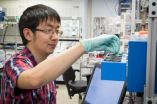(Press-News.org) Dr Stephen Martin and colleagues argue that this strategy is failing patients and wasting healthcare resources. They call for a re-examination of the threshold and urge clinicians to be cautious about treating low risk patients with blood pressure lowering drugs.
Their paper publishes as the Preventing Overdiagnosis conference opens next week (Monday 15 Sept), where experts from around the world will discuss how to tackle the threat to health and the waste of money caused by unnecessary care. The conference is hosted by the Centre for Evidence-Based Medicine at the University of Oxford in partnership with The BMJ's Too Much Medicine campaign.
Up to 40% of adults worldwide have hypertension, over half of which is classified as "mild." Low risk indicates that an individual does not have existing cardiovascular disease, diabetes, or kidney disease.
Over the years, hypertension has been treated with drugs at progressively lower blood pressures. The belief has been that drug treatment of even mildly elevated blood pressure levels in low risk patients may reduce cardiovascular risk.
Over half of people with mild hypertension are treated with medication. Yet treating low risk mildly hypertensive patients with drugs has not been proven to reduce cardiovascular disease or death.
In the US alone, where hypertension is the most common condition for a medical visit, the cost of drug treatment of mild hypertension has been estimated at $32 billion (£19bn; €24bn) per year. This corresponds to more than 1% of annual healthcare costs and more than one third of total US expenditures on public health.
The authors argue that overemphasis on drug treatment "risks adverse effects, such as increased risk of falls, and misses opportunities to modify individual lifestyle choices and tackle lifestyle factors at a public health level."
And they urge clinicians to share the uncertainty surrounding drug treatment of mild hypertension with patients, measure blood pressure at home, improve accuracy of clinic measurements, promote public health investment, and "encourage lifestyle changes to treat hypertension, including weight loss, smoking cessation, decreased alcohol consumption and increased exercise."
An animation to illustrate mild hypertension and its management is available here.
INFORMATION: END
Experts raise concern over unnecessary treatment of mild hypertension in low risk people
Benefits of drug treatment for low risk patients 'still open to question'
2014-09-15
ELSE PRESS RELEASES FROM THIS DATE:
Genetic testing can identify men at 6-fold increased risk of prostate cancer
2014-09-15
Scientists can now explain a third of the inherited risk of prostate cancer, after a major international study identified 23 new genetic variants associated with increased risk of the disease.
The study brings the total number of common genetic variants linked to prostate cancer to 100, and testing for them can identify 1% of men with a risk of the disease almost six times as high as the population average.
Scientists at The Institute of Cancer Research, London, and in Cambridge, UK, and California led a huge search for new genetic variants including almost 90,000 men ...
Rules of thumb for climate change turned upside down
2014-09-15
Based on models and observations, climate scientists have devised a simplified formula to describe one of the consequences of climate change: regions already marked by droughts will continue to dry out in the future climate. Regions that already have a moist climate will experience additional rainfall. In short: dry gets drier; wet gets wetter (DDWW).
However, this formula is less universally valid than previously assumed. This was demonstrated by a team of ETH climate researchers led by Peter Greve, lead author of a study recently published in Nature Geoscience. Traditional ...
Measuring modified protein structures
2014-09-15
Cells regulate protein functions in a wide variety of ways, including by modifying the protein structure. In an instant, a protein can take on another form and perform no or even the "wrong" function: in humans, proteins that fold wrongly can cause serious diseases such as Alzheimer's, Parkinson's or cystic fibrosis. Some of these proteins also have a tendency to "infect" other molecules of the same type and congregate into insoluble so-called amyloid fibrils or plaques. These amyloids can damage cells and tissues and make people ill.
Method breaks the shackles
Until ...
UNC researchers find final pieces to the circadian clock puzzle
2014-09-15
CHAPEL HILL, NC – Researchers at the UNC School of Medicine have discovered how two genes – Period and Cryptochrome – keep the circadian clocks in all human cells in time and in proper rhythm with the 24-hour day, as well as the seasons. The finding, published today in the journal Genes and Development, has implications for the development of drugs for various diseases such as cancers and diabetes, as well as conditions such as metabolic syndrome, insomnia, seasonal affective disorder, obesity, and even jetlag.
"Discovering how these circadian clock genes interact has ...
Cheaper alternative to licensed drug for treating eye disease has similar side-effects
2014-09-15
Health policies which favour using ranibizumab for treating eye disease in older people over safety concerns for a cheaper alternative should take account of a new Cochrane Review published today. The researchers looked at the results of studies which compared the safety of two drugs used for treating age-related macular degeneration, ranibizumab and bevacizumab. Contrary to what was argued by some experts the review has found that the cheaper drug, bevacizumab, does not appear to increase deaths or serious side-effects compared with ranibizumab in people with neovascular ...
Study sheds new light on why batteries go bad
2014-09-15
Menlo Park, Calif. — A comprehensive look at how tiny particles in a lithium ion battery electrode behave shows that rapid-charging the battery and using it to do high-power, rapidly draining work may not be as damaging as researchers had thought – and that the benefits of slow draining and charging may have been overestimated.
The results challenge the prevailing view that "supercharging" batteries is always harder on battery electrodes than charging at slower rates, according to researchers from Stanford University and the Stanford Institute for Materials & Energy Sciences ...
Marijuana users who feel low get high
2014-09-15
PISCATAWAY, NJ – Adolescents and young adults who smoke marijuana frequently may attempt to manage negative moods by using the drug, according to a study in September's Journal of Studies on Alcohol and Drugs.
"Young people who use marijuana frequently experience an increase in negative affect in the 24 hours leading up to a use event, which lends strong support to an affect-regulation model in this population," says the study's lead author Lydia A. Shrier, M.D., M.P.H., of the division of adolescent and young adult medicine at Boston Children's Hospital.
She notes ...
Hypersensitivity to non-painful events may be part of pathology in fibromyalgia
2014-09-15
New research shows that patients with fibromyalgia have hypersensitivity to non-painful events based on images of the patients' brains, which show reduced activation in primary sensory regions and increased activation in sensory integration areas. Findings published in Arthritis & Rheumatology, a journal of the American College of Rheumatology (ACR), suggest that brain abnormalities in response to non-painful sensory stimulation may cause the increased unpleasantness that patients experience in response to daily visual, auditory and tactile stimulation.
Fibromyalgia ...
New knowledge of genes driving bladder cancer points to targeted treatments
2014-09-15
The story of cancer care seems so simple: find the mutated gene that causes cancer and turn it off or fix it. But rarely does a single gene cause cancer. More often, many genes are altered together to drive the disease. So the challenge becomes sorting out which altered genes are the most to blame in which cancers. A collaborative study between researchers at the University of Colorado Cancer Center and the National Cancer Institute (NCI) published today in the journal Clinical Cancer Research takes an important step toward answering this question in bladder cancer.
Specifically, ...
Identifying a better message strategy for dissuading smokers: Add the positive
2014-09-15
WASHINGTON — Which is more likely to convince a smoker to quit? The words, "Warning: cigarettes cause cancer" beneath the image of an open mouth with a cancerous lesion and rotten teeth, or the same image with the words, "Warning: Quitting smoking reduces the risk of cancer"?
The answer depends on how confident you are in your ability to quit, according to a study led by researchers at Georgetown Lombardi Comprehensive Cancer Center and published in the journal Nicotine & Tobacco Research.
The research, which involved 740 participants and three D.C. area institutions, ...
LAST 30 PRESS RELEASES:
Study finds early imaging after pediatric UTIs may do more harm than good
UC San Diego Health joins national research for maternal-fetal care
New biomarker predicts chemotherapy response in triple-negative breast cancer
Treatment algorithms featured in Brain Trauma Foundation’s update of guidelines for care of patients with penetrating traumatic brain injury
Over 40% of musicians experience tinnitus; hearing loss and hyperacusis also significantly elevated
Artificial intelligence predicts colorectal cancer risk in ulcerative colitis patients
Mayo Clinic installs first magnetic nanoparticle hyperthermia system for cancer research in the US
Calibr-Skaggs and Kainomyx launch collaboration to pioneer novel malaria treatments
JAX-NYSCF Collaborative and GSK announce collaboration to advance translational models for neurodegenerative disease research
Classifying pediatric brain tumors by liquid biopsy using artificial intelligence
Insilico Medicine initiates AI driven collaboration with leading global cancer center to identify novel targets for gastroesophageal cancers
Immunotherapy plus chemotherapy before surgery shows promise for pancreatic cancer
A “smart fluid” you can reconfigure with temperature
New research suggests myopia is driven by how we use our eyes indoors
Scientists develop first-of-its-kind antibody to block Epstein Barr virus
With the right prompts, AI chatbots analyze big data accurately
Leisure-time physical activity and cancer mortality among cancer survivors
Chronic kidney disease severity and risk of cognitive impairment
Research highlights from the first Multidisciplinary Radiopharmaceutical Therapy Symposium
New guidelines from NCCN detail fundamental differences in cancer in children compared to adults
Four NYU faculty win Sloan Foundation research fellowships
Personal perception of body movement changes when using robotic prosthetics
Study shows brain responses to wildlife images can forecast online engagement — and could help conservation messaging
Extreme heat and drought at flowering could put future wheat harvests at risk
Harlequin ichthyosis: a comprehensive review of pathogenesis, diagnosis, and management
Smithsonian planetary scientists discover recent tectonic activity on the Moon
Government censorship of Chinese chatbots
Incorporating a robotic leg into one’s body image
Brain imaging reveals how wildlife photos open donor wallets
Wiley to expand Advanced Portfolio
[Press-News.org] Experts raise concern over unnecessary treatment of mild hypertension in low risk peopleBenefits of drug treatment for low risk patients 'still open to question'


